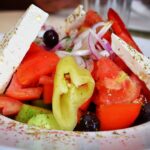How did the Mediterranean diet affected your life? Have you noticed any changes to your health yet? Did you go from zero to hero after adhering to it for months? If that’s the case, then it’s time to share the “gospel” to your family and friends!
The Mediterranean diet is far too beneficial for anyone’s health to let them pass it up. No, in fact, it could be the very thing that they’ve needed all along but just don’t know it yet. So you – who are a patron of this pattern of eating – have a moral obligation to tell your family and friends about how its nutrients can help protect them from chronic illnesses and give a longer life span. Of course, some or maybe most of your family members and friends will not accept the Mediterranean diet so easily or gleefully. Oh no, the mainstream media has conditioned our minds to eat junk food and stay away from the less-than-glamorous fruits and vegetables. But this should not deter you, because you know you’re on a goodwill mission and most of all, you’re saving lives by doing this.
The “Eating Fruits and Vegetables Don’t Taste Good” Myth
Fruits and vegetables can have various tastes when they come in contact with the taste receptors in our tongue, but while some have dull taste most of them actually taste good. By comparison, most junk food also has the usual flavors, except they’re just on steroids – meaning they either taste too sweet, too oily or too salty. The problem is that sugar can be addictive and that’s why most people prefer to drink a can of soda than a glass of freshly squeezed orange juice or red wine. Vegetables taste exquisitely good when herbs and spices are added and are cooked at the right temperatures, whereas fast food meals cannot achieve the same flavorful extravaganza.
So the next time your family and friends say that fruits and vegetables are boring, let them have a sample of Baked Lemon Garlic Salmon, Chicken Shawarma, Hummus, or Greek Lemon Rice and see how their faces light up as the flavors of this dishes bursts in their mouths.
Junk Food vs. Fast Food: Which One Will you Recommend to your Family and Friends?
The truth is that junk food is basically unhealthy, but fast food is a somewhat healthier option (emphasis on healthier because it’s really just a notch up of junk food). This doesn’t mean that it’s healthy to dine at McDonald’s or Jollibee (a new Filipino fast food chain that’s gaining popularity in America and elsewhere) every day. If it’s an issue about time for you not being able to eat healthy due to work schedules and going to a fast food restaurant is your only option, then I suggest you check the menu of the restaurant you want to dine in regularly before you do.
You can eat salad instead of a McChicken just make sure that you don’t include any processed products or fat seasonings. Another great option for a healthy fast food is sushi. Tuna sandwich salad and similar food/snacks that are considered “green” or healthy (e.g. healthy tacos and burritos) are also viable options for a quick meal. Even a veggie pizza seasoned with non-processed tomato sauce and olive oil is healthy. Your family and friends will not have issues eating this stuff if you recommend them to buy fast foods from the right places.
For your friends who are travelling most of their time (probably it’s job-related or some other reason), you may advise them to create a map of food-stops beforehand to enjoy healthy meals even when eating in fast food restaurants. They can even find healthy treats in cafes as long as they understand planning meal times. Inform them also that fast food restaurants and cafes serve food during meal times (i.e. 9am, 12 pm, 3pm and 6pm), so it’s highly likely that they’ll pre-cook some of the dishes to ensure they can serve them quickly.
In case they’re not travelling to faraway places, then you can recommend to your family and friends to do some basic meal prep ideas that can be stored in their fridge, so they can chomp on a health meal before going to work, or take some to work with them and have a healthy snack ready for their lunch break. This way they’ll reduce the chances of them choosing between fast food and junk food as a good dinner.
However, junk food, which makes up the majority of most popular snack types, is notoriously unhealthy. So you, your family and friends had better learn to refrain from buying those instant Doritos in the shelf if you want to lead a healthy life. If you’re reading this blog post together with your family or friends, then you ought to know that you better switch your diet patterns from the traditional Western diet to the Mediterranean diet. Or if not, then invite them to read this article as it can change and even save their lives.
Keep this distinction between fast food and junk food in mind, so you can feed your body with healthy meals and not munch on foods loaded with processed sugars, sodium and unhealthy fats.
Recommended Reading: Breast Cancer and the Mediterranean Diet
Dangers of Junk Food and Fast Food
I would define junk food as food and drinks that have little-to-no nutritional value such as vitamins, minerals and fiber, and are loaded with calories, fat, sugars (including processed sugars) and sodium. Now on the midpoint of the spectrum is fast food. It’s a type of food that you can get from a restaurant in a matter of minutes, thus the name “fast food.” Although some fast food are healthy (i.e. salad, sushi and sandwiches) others are not good for your health. In the United States approximately 36.6% of adults eat fast food daily (some of your family and friends might be included in this statistics) – that’s about 84.4 million Americans! You can assume that half of the food they eat are unhealthy food. Yikes!
Eating junk foods in rare occasions like when binge watching Netflix or Disney+ shows you’re your family or friends may not hurt, but regularly eating it can increase your risk to obesity and chronic diseases. Studies show that consuming junk food in excess can lead to CVD (cardiovascular disease), type 2 diabetes, fatty liver diseases (non-alcoholic related) and certain types of cancers. Furthermore, some of the chemicals in fast foods may not be good for you. Look at them below;
- Most of them are high in sodium and sodium can cause headaches and migraine and even CVD
- They can trigger acne outbreaks in teens due to their high carbohydrates content
- Excessive consumption of junk food may cause you to become depressed
- The carbs and sugar in fast foods can lead to dental cavities
- Deep fried foods which are cooked using oils with trans fats can increase the bad (LDL) cholesterol in your body
- Because most fast foods are heavy on carbs they can raise your blood sugar levels and cause your cells to become insulin-resistant, which will ultimately lead you to developing type 2 diabetes
- Ingesting high amount of sodium will cause bloating in your stomach, because sodium causes your intestines to retain excess water
How to Create a Healthy Diet
Tell your family and friends that if they want to avoid the negative health risks associated with eating junk food, then they should adopt a diet that’s both nutritional and diverse. But what could be a more diverse diet than the Mediterranean diet, right? Small changes to your diet can make an immense difference to your health. It’s actually not that hard to make those changes and all you have to do is to follow the 8 goals we’ve outlined below (of which you can follow 6 of them easily):
- Make half your plate fruits and vegetables: Scientists found that the vitamins, minerals and fiber that your body needs are found in the various colors of fruits and vegetables, so be sure to choose a variety of red, orange and green vegetables (such as tomatoes, sweet potatoes and broccoli).
- Make half the grains you eat whole grains: Whole grain foods are less likely to give you high blood sugar than processed grains. From now on include whole wheat, brown rice, bulgur, buckwheat, oatmeal, rolled oats, quinoa or wild rice in your diet to boost your health and well-being.
- Switch to fat-free or low-fat (1%) milk: Low fat and fat-free milk is filtered off of calories and less saturated fat, but has the same amount of calcium and other nutrients that you find in regular milk. The Mediterranean diet on the other hand recommends that you consume lesser dairy products like milk, eggs and cheese and prefer the healthier alternative such as Greek yogurt and feta cheese.
- Choose a variety of lean protein foods: Consume red meat twice a month, white meat 4 times a month and fish and other seafood twice a week, but you can also get protein from legumes and vegetables too!
- Compare sodium in foods: If it is at all possible, avoid canned foods as you can season your food with herbs and spices instead of salt. If not, however, choose canned foods with labels stating low sodium, reduced sodium or no salt added.
- Drink water instead of sugary drinks: Drinking water helps you cut down on calories, replenish your body and quench your thirst. Drinking sodas and energy drinks will cause your blood sugar to spike and make you insensitive to insulin, which will make you fat (or obese) and you’re at risk of developing type 2 diabetes. Alternatively you can make fruit infused water and drink that instead of sodas and beverages.
- Eat some seafood: The nutrients you can find in seafood like fish and shellfish include protein, minerals and omega-3 fatty acids.
- Cut back on solid fats: You may want to avoid cakes, cookies, ice cream and processed meat, as they are major sources of solid fats.
By educating your family and friends about these 8 healthy goals and how it all connects to the Mediterranean diet, you’ll help them eat healthy, get the proper nutrients their body needs and reduce intake on unhealthy foods. Make sure to enjoy your meals by eating together and share wonderful moments, play fun games that doubles as physical exercise and enjoy a daily 20-minute walk.








2 Responses
Thanks! I’ll share this to my family and friends.
I showed this blog post to some of my family and friends and they said that you made a good point. We’re trying out some Mediterranean recipes as I post this comment. Thanks!